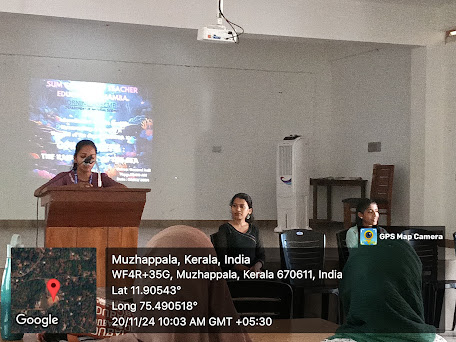NATIONAL SPACE DAY
India's space history is a remarkable journey of scientific achievement, innovation, and perseverance, spearheaded by the Indian Space Research Organisation (ISRO).
1. Early Beginnings: (1962) The Indian National Committee for Space Research (INCOSPAR) was established under the leadership of Dr. Vikram Sarabhai, considered the father of the Indian space program. In 1963;India's first rocket, a small American-made Nike-Apache, was launched from the Thumba Equatorial Rocket Launching Station (TERLS) in Kerala.
2. Formation of ISRO:(1969) The Indian Space Research Organisation (ISRO) was founded, replacing INCOSPAR, with a focus on developing indigenous capabilities in space technology. Early Satellite Development:(1975) India launched its first satellite, Aryabhata, from the Soviet Union. This marked India's entry into the space age. In 1980 India launched Rohini-1, the first satellite to be placed in orbit by an Indian-made launch vehicle, SLV-3. In 1993 The Polar Satellite Launch Vehicle (PSLV) was successfully launched. It became a workhorse for ISRO, known for its reliability in placing satellites into sun-synchronous orbits. -2001 saw The Geosynchronous Satellite Launch Vehicle (GSLV) made its first successful flight, enabling ISRO to launch heavier payloads into geostationary orbits.
3. Chandrayaan mission 2008: Chandrayaan-1, India's first lunar mission, was launched. It discovered the presence of water molecules on the Moon, a significant scientific achievement. In 2019 Chandrayaan-2 aimed to land on the Moon's south pole. While the orbiter was successful, the lander, Vikram, lost contact during descent.
4. Mars Mission: Mangalyaan or the Mars Orbiter Mission (MOM) was launched. India became the first country to reach Mars on its first attempt and the fourth space agency to reach Mars. National Space Day in India commemorates the successful landing of Chandrayaan-3 on the Moon. It is celebrated on 23 August 2024.
On 23 August 2023, the Indian Space Research Organisation Reached a significant milestone by successfully landing Chandrayaan-3's lander and rover on the Moon. Chandrayaan-3 mission accomplished safe and soft-landing of Vikram Lander on the lunar surface.
With this, India became the fourth country to land on the moon and first to land near the southern polar region of the moon. The soft-landing was followed by the successful deployment of Pragyan Rover. The landing site was named as 'Shiv Shakti' point (Statio Shiva Shakti).
Our honorable Prime Minister Narendra Modi proclaimed August 23 as "National Space Day" in India. The first National Space Day will be celebrated across India in 2024. The Government of India is launching a month-long campaign to showcase the achievements of India's space missions and to inspire the youth.
This year's theme, "Touching Lives while Touching the Moon: India’s Space Saga," highlights the significant impact of space exploration on society and technology. A grand two-day event will take place at Bharat Mandapam in honor of National Space Day, showcasing a range of high-profile sessions, interactive exhibitions, and significant announcements related to India’s space achievements .
The Future Prospects of ISRO is Gaganyaan: ISRO's human space-flight mission, aiming to send Indian astronauts into space by 2024. Aditya-L1: A mission to study the Sun, focusing on solar corona observations.ISRO's Mars Orbiter Mission 2 (Mangalyaan-2) and a potential Venus mission are also on the horizon. India's space program has grown from humble beginnings to become a major player on the global stage, known for cost-effective and innovative solutions in space exploration.





Comments
Post a Comment